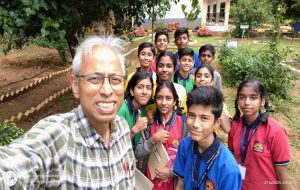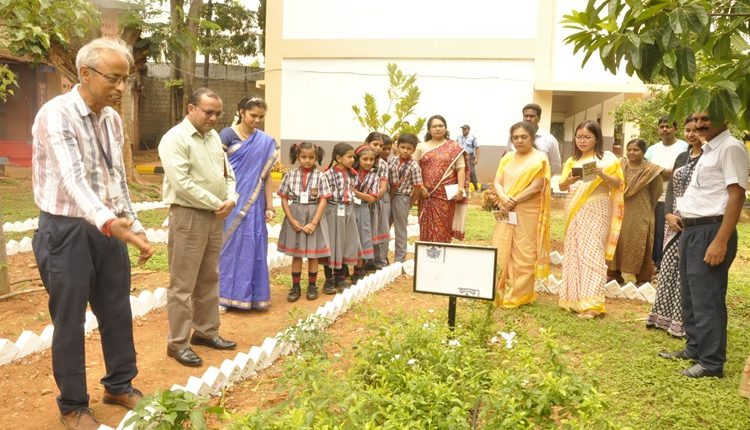“AI Lacks The Emotional Intelligence And Empathy That Teachers Provide”
Ashok Sengupta is our Amazing Teacher this week. He is the recipient of the prestigious National Teachers’ Awards 2024
Meet Ashok Sengupta – teacher, environmentalist, researcher, photographer, and musician. There are many facets to his personality. While he teaches Computers at PM Shri KV No 1 Jalahalli, Bengaluru, he describes himself as a teacher by profession and an entomologist by passion. Read below to know more about him…
How would you describe yourself?
What a difficult question for me.
It’s always challenging to describe oneself! I’m someone who enjoys innovating, exploring, and continuously learning. I approach my work meticulously and with dedication.
Professionally, I’m an ICT teacher, but my passion lies in entomology, particularly in nature conservation and wildlife photography. I’ve spent a lot of time studying butterflies, and beyond that, I also travel extensively across the country. Another love of mine is music—specifically, I play the harmonica, so I can call myself a musician as well.
I also love meeting new people and making friends.
What prompted you to become a teacher?
To be honest, teaching was never my first choice. I was quite young and had just completed my undergraduate diploma from Polytechnic. I was looking for a job, and the opportunity to become a work-education teacher came up.
It was nostalgic to join the same school where I had studied just a few years earlier. That’s where my teaching journey began. At first, the students didn’t take me seriously. They used to call me bhaiya (elder brother) when I was a student, so accepting a former schoolmate as a teacher wasn’t easy for them.
It was nostalgic to join the same school where I had studied just a few years earlier. That’s where my teaching journey began. At first, the students didn’t take me seriously. Accepting a former schoolmate as a teacher wasn’t easy for them.
Also, at that time, I was more of a techie, aiming for a career in telecommunications. But something clicked. I was assigned to teach computer science, even though back in the early 90s, computers were far less advanced and more cumbersome. Interestingly, I taught computer science without a single computer in the classroom for the first 1.5 years. It was a challenge, but that’s where I started to fall in love with teaching.
Read Also: Six Free AI Tools Available On Net For Teachers
Was teaching in your own school your biggest challenge?
One of my biggest challenges was teaching students who were just a few years younger than me and still saw me as their senior or bhaiya. Gaining their respect as a teacher took effort, but eventually, I earned it.
How do you think AI will impact teaching methodologies or teachers?
AI is becoming a valuable tool for teachers, making classrooms more engaging and helping with tasks like generating questions and preparing lessons. For example, you can ask AI to create 20 multiple-choice questions on a specific topic, and it will do so in seconds. Teachers can then refine these to suit their curriculum.
However, we have to be cautious. AI is not infallible — it sometimes produces incorrect or misleading information. Teachers need to be knowledgeable enough to discern when AI is generating false or vague answers.

Do you think AI will replace teachers?
Not in the near future. AI lacks the emotional intelligence and empathy that teachers provide. A teacher understands the emotional and intellectual needs of their students. For instance, when a student is struggling to learn, it takes a human touch to reach out and inspire them, something AI simply can’t do at this point.
Tell us about your love for butterflies?
We have a butterfly park in our school. I manage that park. On weekends, I invite students to come for sessions where we delve into the hidden secrets of nature, things that often go unnoticed. By focusing on the micro-level, I show them the intricate processes that occur in the natural world. We then maintain and care for the plants in the park, learning how to nurture and protect them.
I also go on trips with friends to the Western Ghats, where we document butterflies as part of our conservation efforts.
What about your love for music? Tell us about it?
On certain Sundays, my friends and I have harmonica club meetings, where I get to practice and play. Every night, I make time to practice before bed, always working on learning new songs and refining my techniques. We also attend monthly or bi-monthly concerts where I perform. I find music as refreshing as any sport I play. I am a sports lover too.
Many children today aren’t familiar with basic principles of cleanliness and environmental responsibility. This mindset needs to change, and I believe the solution lies in teaching children to love nature first. Once they care about the environment, other habits will follow.
You’ve won a National Award for your services as a teacher, and you’re retiring next year. What are your plans afterward?
In my second innings, I plan to focus on nature education and conservation. My goal is to teach young people to love and appreciate nature, to experience it firsthand, and to understand the environmental challenges we face.
Many children today aren’t familiar with basic principles of cleanliness and environmental responsibility. Even as adults, people still have habits like tossing a wrapper on the ground. This mindset needs to change, and I believe the solution lies in teaching children to love nature first. Once they care about the environment, other habits will follow.
I believe classroom education is important, but it shouldn’t be the entirety of a child’s learning. Nature offers its own lessons — in mathematics, physics, biology, language, literature, and more. If we expose children to nature, we’ll see positive changes in their thinking, emotions, and behaviour, and in turn, we’ll build a better nation. This is my goal after retirement.
Do you feel strongly about education? Have a story to share? Write to us at info@thepeepertimes.com or connect with us on Facebook or X (Twitter) or LinkedIn




Comments are closed, but trackbacks and pingbacks are open.